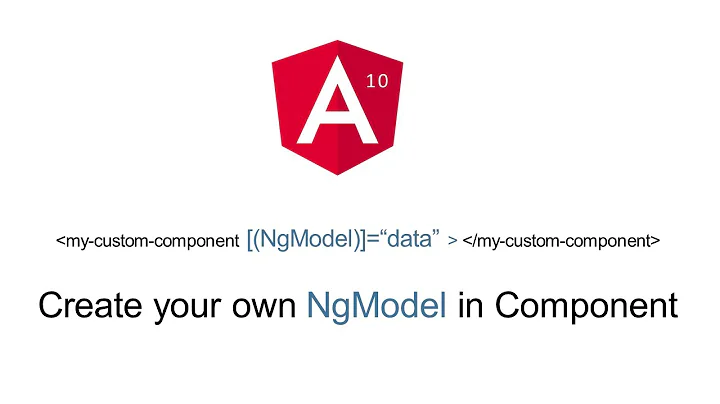Angular2: use [(ngModel)] with [ngModelOptions]="{standalone: true}" to link to a reference to model's property
Solution 1
Using @angular/forms when you use a <form> tag it automatically creates a FormGroup.
For every contained ngModel tagged <input> it will create a FormControl and add it into the FormGroup created above; this FormControl will be named into the FormGroup using attribute name.
Example:
<form #f="ngForm">
<input type="text" [(ngModel)]="firstFieldVariable" name="firstField">
<span>{{ f.controls['firstField']?.value }}</span>
</form>
Said this, the answer to your question follows.
When you mark it as standalone: true this will not happen (it will not be added to the FormGroup).
Reference: https://github.com/angular/angular/issues/9230#issuecomment-228116474
Solution 2
For me the code:
<form (submit)="addTodo()">
<input type="text" [(ngModel)]="text">
</form>throws error, but I added name attribute to input:
<form (submit)="addTodo()">
<input type="text" [(ngModel)]="text" name="text">
</form>and it started to work.
Related videos on Youtube
Calvin Hu
Updated on October 24, 2021Comments
-
Calvin Hu over 2 years
Let's say I have a typescript object of type Mailtype like following:
export class Mailtype { constructor( public name?: string, public locale?: string, public email?: string, public properties? : Property[] ) { } }Where its "properties" field is an array of type Property:
export class Property { constructor( public name?: string, public type?: string, public example?: string, public required?: boolean, public masked?: boolean ) { } }Now in my component I have a single Mailtype object and the html has a form element used for editing and adding to the properties array of the Mailtype:
<form> <tr *ngFor="let property of model.properties; let i=index"> <td> <input type="text" [(ngModel)]="property.name" required> </td> </tr> <button (click)="onAddProperty()">Add property</button> </form>component:
export class MailtypeComponent { model : Mailtype; constructor() { this.model = new Mailtype('','','',[]); this.model.properties.push(new Property()); } onAddProperty() { this.model.properties.push(new Property()); } }I was wondering if I'm not allowed to use [(ngModel)] to link to a reference "property" to the array element in the array, especially at the same time I'm iterating the array? Because it throws the following error for the above code:
ORIGINAL EXCEPTION: If ngModel is used within a form tag, either the name attribute must be set or the form control must be defined as 'standalone' in ngModelOptions. Example 1: <input [(ngModel)]="person.firstName" name="first"> Example 2: <input [(ngModel)]="person.firstName" [ngModelOptions]="{standalone: true}">So it's suggesting I use either
[ngModelOptions]="{standalone: true}"or add a name field to the html. And it looks like[ngModelOptions]="{standalone: true}"works in this case. What doesstandalone: trueactually mean since I cannot find any documentation about it?-
 gustavo herrera almost 7 yearsRemeber that all component or controlles within form should be name, also external controllers like prime ng, ngBootstrap. ExamplePrimeNg
gustavo herrera almost 7 yearsRemeber that all component or controlles within form should be name, also external controllers like prime ng, ngBootstrap. ExamplePrimeNg
-
-
 B--rian over 4 yearsWelcome to SO! Please edit your answer so that it contains some textual explanation, relates to the question, ...
B--rian over 4 yearsWelcome to SO! Please edit your answer so that it contains some textual explanation, relates to the question, ...





